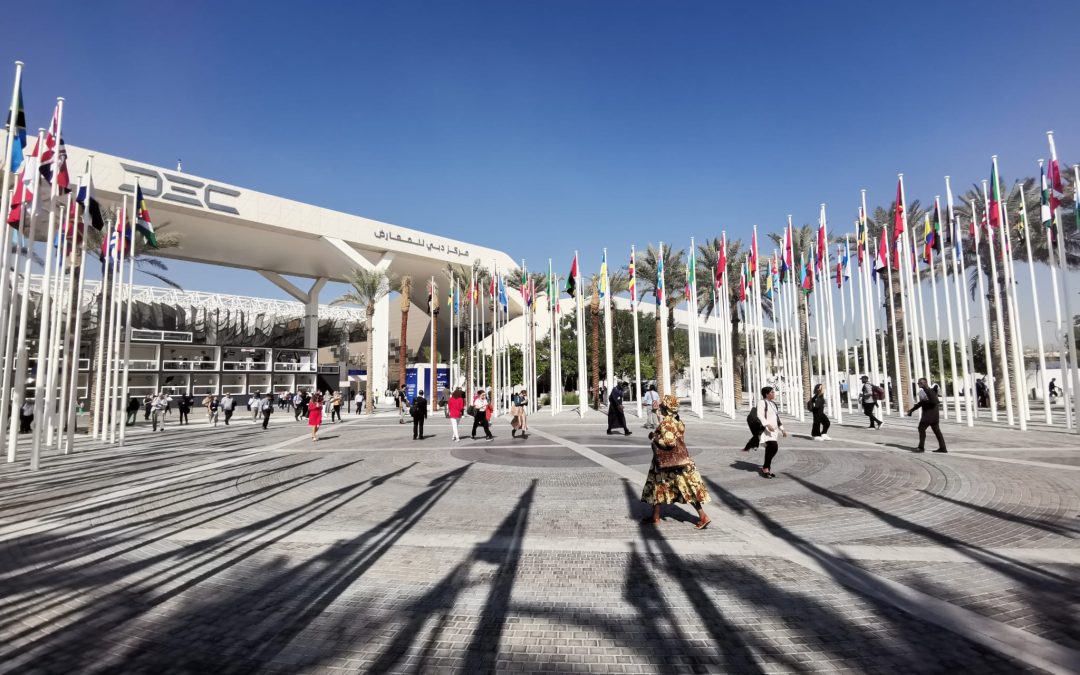Written by Charlie Davies, Lynn de Miranda and Juan Garcia Valencia
Day 4 of COP28 brings together controversial themes resulting in an interesting narrative.
On the fourth day of COP28 we enter the third thematical day titled ‘’Energy, industry, just transition and indigenous people’’. In the past, thematical days have been limited to a singular theme, but this year, there has been much discussion around the relevance of grouping these seemingly unrelated topics together.
The first of today’s themes is “Energy and Industry”. It is well known that the historical reliance on fossil fuels as energy sources has contributed significantly to climate change. For example, in 2020, energy-related CO2 emissions accounted for 73% of global greenhouse gas emissions. Although much emphasis has been put on the reduction of these emissions within industry, results from the Global Stocktake has made it clear that more needs to be done to meet the climate goals.
The second theme, “Just Transition”, emphasizes fairness, inclusivity, and social equity to ensure that workers and communities are not left behind during this shift. This theme seeks to distribute the benefits of a green economy fairly and support the changing workforce.
The third theme focuses on “Indigenous People” . Indigenous worldviews are often characterised by a deep connection to land and unique knowledge of sustainable land management. Their time-tested strategies for resilience in dynamic environments offer valuable insights that can fortify current and future efforts to adapt to climate change. The significance of working with and integrating indigenous communities in climate action is increasingly recognised and yet, the number of indigenous delegates at COP28 still sits only around 500 compared to the 2456 fossil fuel delegates.
Today, discussions began around core pillars of the oil and gas decarbonization charter and how meeting the 1.5 ºC target is about the emissions and not the fuel source. In his closing statement Jean Paul Prates, President of Petrobras a Brazilian Petroleum Corporation stated, “The journey of energy transition will be a story of integration of different energy sources, and a gradual substitution towards decarbonisation”, later remarking “we are big guys, and we can do big things”. However, Minoru Takada, Secretary for UN-energy, UN Department of Economic and Social Affairs, encourages that the 21st century is going to be powered by renewable energy. Yet, he recognises “significant change is going to be needed to address climate change but also sustainable development challenges”.
Although the transition from fossil fuels to renewable energy seems inevitable, how to make this transition fair is still debatable. “Just transition has the potential to drive ambitious climate action” says Ina Parvanova, Director of Communications and Engagement at UN Climate change, and it can “build trust and facilitate transformative development”. However, the shift to renewable has come with a fair share of criticism. Large-scale energy projects, even if they’re renewable, can have destructive implications on the environment and communities. It is vital we consider these issues when moving forward with Just Transition, by not solely focus on the end goal, but about how we get there.
As the world struggles to define the pathways for a Just Transition to renewable energy, it may be mutually beneficial to incorporate indigenous communities and their knowledge into this transition.
“Our knowledge, our culture, our governance all hold what the Just Transition really is, and that is to be connected … and to care about people and our communities” says Serena Mendizabal, the Just Transition Lead at Sacred Earth Solar.
Serena further highlighted the paradox in transitioning to renewable energy sources, such as hydroelectric power and solar energy, pointing out their often inherent association with mining and large-scale energy storage facilities that frequently affect indigenous lands. It is exactly this unfair impact on indigenous communities that must be considered in the transition to renewable energy, emphasising the need for the energy-industry-indigenous people nexus.
This community-based perspective has also been proven effective outside indigenous communities. “Global communities can look at the action happening at the city level and see that it is possible to deliver a just transition that is fit for everyone and the planet. Cities are important spaces where the momentum to achieve just, low carbon emissions can be built.” Says Yvonne Aki-Sawyerr, C40 Co-chair and Mayor of Freetown. This highlights the need of community-based perspectives to insure a fair and equitable transition.
Combining the themes of “Energy and Industry”, “Just Transition” and “Indigenous People” is an important action that will help us deal with the complexity and urgency of the climate crisis. Together, they represent a holistic approach to climate action and a way to achieve an inclusive energy transition that benefits all without leaving anyone behind.


